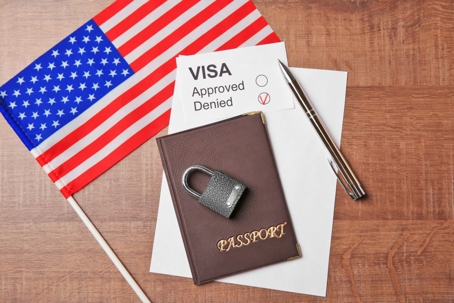Understanding why you could be denied entry into the U.S. is crucial for avoiding potential pitfalls. Here are the top seven reasons we often encounter:
1. Overstaying Your Visa or Unlawful Presence
One of the most common reasons for denial is overstaying your visa or having unlawful presence in the U.S. If you've previously overstayed your visa, immigration officials might flag your entry and cancel your current visa. It's essential to address any periods of unlawful presence with proper documentation, such as an approved visa extension notice.
2. Working Without Authorization
Another frequent cause for denial is working without authorization on a previous visit. Even seemingly innocuous activities like babysitting for pay or selling a car can be construed as unauthorized work. Border Patrol can cancel your visa if they determine you've engaged in work activities without proper authorization.
3. Misrepresentation of Facts
Any form of misrepresentation can lead to denial. This includes providing incorrect information about your marital status, identity, or other key facts. Even seemingly minor inaccuracies can be considered willful misrepresentation, leading to visa cancellation and denial of entry.
4. Suspected Immigrant Intent
Border Patrol may deny entry if they suspect you have immigrant intent while holding a non-immigrant visa, such as a tourist visa. This suspicion arises if they believe you intend to stay in the U.S. permanently. To avoid this, always be prepared to demonstrate your ties to your home country and your intention to return.
5. Drug-Related Issues
Any association with drugs, including legal marijuana, can lead to denial of entry. It's crucial to avoid any drug-related activities, even on social media, as they can trigger inadmissibility under U.S. immigration laws.
6. Criminal History
Certain criminal activities make you inadmissible to the U.S. Crimes involving moral turpitude (CIMTs), controlled substance offenses, and other serious charges can prevent entry. Always consult with an immigration attorney if you have any criminal history to assess your situation before traveling.
7. Using Fraudulent Documents
Using documents that don't belong to you, such as a passport or birth certificate, is a serious offense. This can result in immediate denial of entry, expedited removal, and long-term repercussions on your immigration record. Always use your own, valid documentation when traveling.
What to Do If You Face Denial
If you're denied entry, the best course of action is to consult with an immigration attorney immediately. Here's a general approach:
1. Schedule a Consultation: Start with a detailed consultation to understand what happened.
2. Request Records: Obtain all relevant records from the incident to review what Border Patrol has documented.
3. Discuss Options: Depending on the findings, explore potential solutions like filing a waiver, reapplying for a visa, or contesting the denial if there was a misunderstanding.
Empowerment Tip: Financial Capability and Intelligence
Today's empowerment tip focuses on improving your financial capability and intelligence. Regardless of your immigration status, financial opportunities exist. Many undocumented immigrants successfully run businesses and achieve financial stability. Work towards your financial goals, and if your immigration status hinders you, seek legal help to potentially open more doors.
Stay Updated and Informed
If you found this information useful, please subscribe to our YouTube channel and hit the notification bell to stay updated on immigration news and tips. For instance, we're closely following potential executive orders from the Biden administration that could impact border policies.

